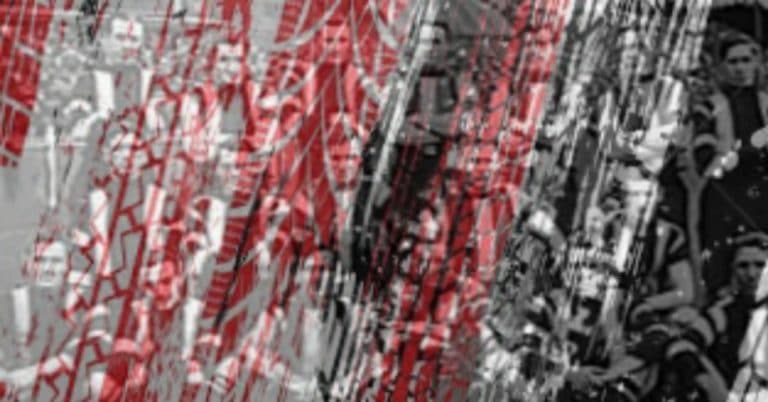Well, it’s nearly here. The start of another men’s AFL season. After what has felt like the longest off-season in memory (but has literally been the shortest), we are but mere days away from starting the season off with the traditional round one match-up of the Tigers of Richmond versus the Blues of Carlton.
After all the hype and build-up, a blowout round one result, particularly if your team is on the receiving end, can feel like you’ve just found out that Santa doesn’t exist. It’s peeking behind the curtain in the Wizard of Oz, it’s finding out Lance Armstrong’s a drug cheat, it’s like ten thousand spoons when all you need is a knife… sorry, I got a bit carried away there, but the point is that getting thumped in round one feels like having all of the hopes and dreams and promises of a new season shattered in one fell swoop.
Because I love history (or perhaps it’s because I’m mildly deranged), I decided to try and find the first ‘great’ round one game and boy howdy did I find one. Come with me, dear reader, on a trip back to the year of our lord 1900 – a year before Australia would elect their first Prime Minister, a year in which German theoretical physicist Max Planck would publish ‘Planck’s law’, marking the birth of quantum physics, and a year in which St Kilda would start their fourth season in the nascent VFL still trying to win their first game. It should be noted that I came across this game while researching a larger piece about the St Kilda football club – this is coming your way shortly, so keep your eyes out, Saints fans.
St. Kilda’s record in the first three seasons of the VFL somehow look even worse than 48 straight losses would indicate. Only once was their losing margin within a goal – a round six, 1899 two-point loss to Carlton, and if we’re being honest, this was a game that they should have won. Entering the final term, the Saints led the Blues by fifteen points, having held Carlton to just one goal over the first three quarters. However, Carlton would come storming home in the final quarter, kicking three goals to the Saints one behind to ensure the Saints winless streak continued.
The 1899 season would finish in disastrous fashion for the Saints with their two losses to Geelong in the final month of the season combining for a truly horrific aggregate scoreline of 0.3.3 to 39.47.281. That’s not a misprint – across two full game of football (albeit 1899 VFL football), the Saints managed just three behinds, while allowing a cumulative 86 scoring shots against them. Just imagine if these Cats’ teams could kick straight! In the wake of these losses, it was reported in the Argus that the league would have to look hard at St Kilda’s tenure in the league.
There’s a quote about St Kilda (credited to the Australasian) from around this time that goes some way to describing their team in these first three seasons. “Two classes of men play football. With one the pleasure of participating is more than sufficient recompense for defeat: the other class thinks that a win is above everything else. To the first class I think those happy, genial Saints belong.”
It is in this atmosphere that the Saints enter Round One, 1900, question marks over their place in the competition; only once before having kicked more than five goals in an entire match; and only once being within a kick of the opposition at the end of the game. In order to try and try and correct these dismal records, the Saints added a bevy of new players from the junior ranks, leading The Age newspaper at the time to remark that this “is a great triumph for junior football, [one] which should keep it before the eyes of the league, the association and the public.”
The really tricky thing you find when writing about old games is the lack of quality reporting. By this, I don’t mean that there weren’t good football reporters back in 1900 – just that it’s extremely hard to find any of them. In the case of St Kilda’s round one, 1900 game against Melbourne this is certainly true and it’s a real shame, because the game looks like it was a thriller. As a result, I’m going to be relying upon the only recap of the game I have found – in the aforementioned The Age newspaper.
The first half was dominated by the team kicking with the wind – the Saints starting with it and kicking six goals in the opening term, then Melbourne returning the favour in the second, kicking six of their own. At half time, the Demons led by six points. The second half was an arm wrestle, The Age tells us, “[with] the wind having dropped … the quick, clever play of … St Kilda … was so effective that had it not been for the splendid efforts of [Melbourne players] Cumberland, McGinis and Moodie, Melbourne [would have lost]”. Indeed, this brings us to the most fascinating thing about the game – on the day, Melbourne didn’t lose. At the end of regular time, the game was declared a draw.
Again, we’ll go to The Age for some background. “For the first time since 1897, the St Kilda team left the field undefeated on Saturday, the result of their match against Melbourne being a tie, subject however, to a point the league will have to decide, involving the legitimacy or otherwise of a behind kicked by Melbourne, which St Kilda claim should be disallowed.” The story goes that, late in the third quarter, Melbourne player Arthur Sowden kicked the ball to Dick Wardill, whose resulting shot at goal registered a behind – the issue being that the three-quarter time siren rang as the ball was in mid-air between Sowden and Wardill. The resultant behind, the Saints argued, should be scrapped from the score, giving the Saints their first win.
I have tried my best to find any articles that detail what happened at the league proceedings as they tried to decide the final result but haven’t found anything. Did Melbourne try and defend the draw? I don’t know. Was the umpire put on the witness stand, hounded by lawyers acting on St Kilda’s behalf? I can’t tell you. You know what, maybe it’s time for some Mongrel Punt Masterpiece Theatre. As it’s a courtroom drama, I think we’ll have four characters – a lawyer for St Kilda (helpfully called ‘Saint’), a lawyer for Melbourne (he can be called ‘Demon’), a witness – the umpire (called, I dunno, ‘Umpire’), and a judge.
Fade In.
SAINT
When Sowden kicked the ball forwards, did you hear the siren?
UMPIRE
Have you ever umpired a match, son?
SAINT
No sir.
UMPIRE
Ever tried to keep men in line, make them follow a strict set of rules?
SAINT
No sir.
UMPIRE
Have you ever been despised for what you do, made a mockery of at every step, seen as an impediment to a good time?
SAINT
Well, I am a lawyer —
UMPIRE
(interrupting Saint)
We umpires make decisions, son. We make decisions or people die. It’s that simple.
SAINT
I think that might be a bit of a stretch —
UMPIRE
(interrupting Saint again)
Are we clear?
SAINT
Crystal.
SAINT speaks with the quiet confidence that comes with knowing you’re about to drop your opponent.
SAINT
I just have one more question. If you heard the siren for three-quarter time, blew the whistle immediately thereafter, andyour orders are always followed, why did the players keep playing?
And UMPIRE has no answer. Nothing. He just sits there, and for the first time, appears lost.
UMPIRE
Sometimes men take matters into their own hands.
SAINT
No sir. You made it clear moments ago that the players are not permitted to take matters into their own hands. ‘You make decisions or people die.’
The DEMON, sensing a shift in power, tries to interject.
DEMON
Your honour, I have to ask for a recess to —
SAINT
I’d like an answer to my question.
JUDGE
The court’ll wait for an answer.
SAINT, sensing his moment.
SAINT
Umpire? You didn’t hear the siren, did you? But you just let play continue on, depriving the Saints of their first win.
UMPIRE
You want answers?
SAINT
I think I’m entitled to them.
UMPIRE
You want answers?!
SAINT
I want the truth.
UMPIRE
You can’t handle the truth!
And nobody moves.
UMPIRE
Son, we live in a world that has rules. And who’s going to enforce them? You? You Lt. Weinberg? I have a greater responsibility thanyou can possibly fathom. You weep for the Saints and you curse the umpires. You have that luxury. You have the luxury of not knowing what I know: that this result, while tragic, probably saved lives. And my existence, while grotesque and incomprehensible to you, saves lives.
(beat)
You don’t want the truth. Because deep down, in places you don’t talk about at parties, you want me on the ground, you need me on the ground.
(boasting)
We use words like honour, code loyalty … we use these words as the backbone to a life spent umpiring something. You use them as a punchline. I have neither the time nor the inclination to explain myself to a man who rises and sleeps under the blanket of the rules and structure I provide, then questions the accuracy with which I provide them. I’d prefer you just said thank you and went on your way. Either way, I don’t give a damn what you think you are entitled to.
SAINT
Did you mis-hear the siren?
UMPIRE
I heard what I heard.
SAINT
Did you mis-hear the siren.
UMPIRE
You’re goddamn right I did.
Silence. From everyone.
SAINT
Please the court, I suggest we declare the Saints the winners on account of bad hearing.
JUDGE
Demon?
DEMON
Sure.
Fade Out.
And so it is that the Saints’ first win in the then-VFL occurred only after the league was forced to change the result of the round one match – days after the game was completed. Of course, I can only assume that the above actually occurred, but I’d like to think you’d agree with me that this is the most likely scenario. This would end up being the Saints only win for the year and it would take them more than twelve months to finally win a game on the day of the match – an 18 point victory over Carlton in round 12 of the 1901 season.
Hopefully your team doesn’t have to wait too long for their first win of 2021. But until then, let’s just be thankful that the football is back.
As always, if you’d like to support us to grow and produce more of this great (?) content, you could become a member by clicking the image below. I’d really appreciate it.
Come on… click the image below and help an old mongrel out.


